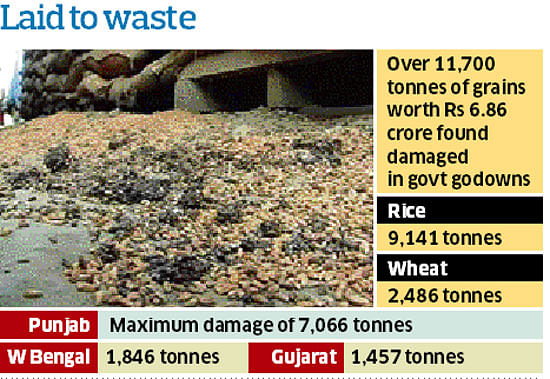Food grains rot in the open as prices rise

A Bench of Justices Dalveer Singh and Deepak Verma admonished the government for its lackadaisical attitude in preserving precious food grain. They said: “If you cannot store them (food grains), give it to the people to eat.”
The Supreme Court’s observations come at a time when people across the country continue to reel under the unending pressure of the rising prices of essential commodities, including food grains and vegetables. The government has not been able to check the runaway prices of essential commodities.
The apex court’s stand on the issue coincided with Food and Agriculture Minister Sharad Pawar’s immodest admission in the Lok Sabha that over 11,700 tonnes of food grains worth Rs 6.86 crore was found “damaged” in government storage facilities. “Reports have been received about damage to wheat and rice stocks in Food Corporation of India depots in some towns of Uttar Pradesh,” Pawar said.
According to data submitted by Pawar, the maximum damage of 7,066 tonnes of foodgrains was reported from Punjab, followed by 1,846 tonnes from West Bengal and 1,457 tonnes from Gujarat. Of the food grains damaged, 9,141 tonnes was rice while 2,486 tonnes was wheat, and the remaining 81 tonnes was paddy.
While hearing a public interest litigation filed by the People’s Union for Civil Liberties, the Supreme Court said: “It is a serious problem and we are sure the government has identified it. However, we do not see any effective steps taken to solve this problem. Committees have been formed and various resolutions have been passed. But there is no implementation of the decisions taken.”
In its ruling, the Bench said that in a “country where admittedly people are starving, it is a crime to waste even a single grain. The official statement made by the government indicates that there is wastage of food at many places.”
The court advised the government to “consider constructing adequate warehouses or storage facilities on a long-term basis.”
It suggested that it can, “on a short-term basis,” also consider hiring warehouses or putting up waterproof tents to save the grain and that “all-out efforts must be made to ensure that not a single grain is wasted.”
Directions
Even as Additional Solicitor General Mohan Parasaran assured the Bench that steps would be taken to address the issue, it sought a response from the union food and civil supplies secretary within two weeks and asked the government to discontinue supply of subsidised foodgrains to people above poverty line. It also directed the government to provide food grain according to the size of the family among below poverty line card holders.
The judges suggested that the public distribution system should be computerised to avoid pilferage and corruption, that the system should be linked to the Unique Identification Authority of India and fair price shops should be operated by government bodies rather than private agencies.
The court’s attention to the grave situation was drawn by advocate Colin Gonsalves, who pointed to a report in a newspaper, saying that a large quantity of grain was being wasted as the government did not have any facility to store it.
He cautioned that if the grains were left to rot in the open for six more months, they would not be fit even for consumption of cattle.
In its observations, the Bench also asked the Centre to furnish its reply to the report of the Justice Wadhwa Committee which was set up to look into the causes of starvation deaths. The Wadhwa panel had recommended construction of warehouses for storing foodgrains.
DH News Service
Deccan Herald is on WhatsApp Channels| Join now for Breaking News & Editor's Picks